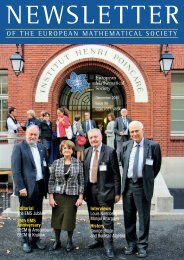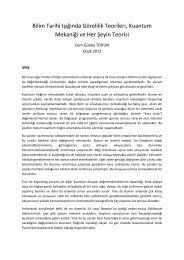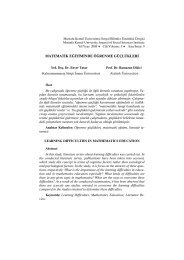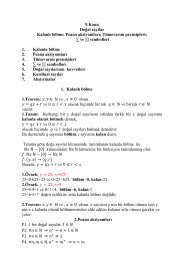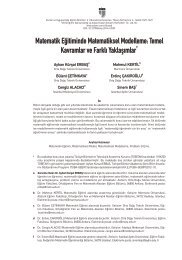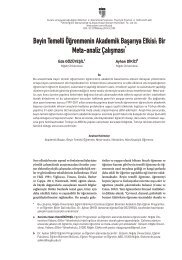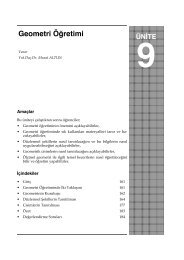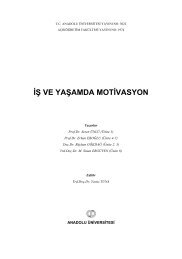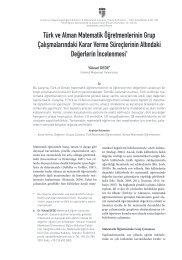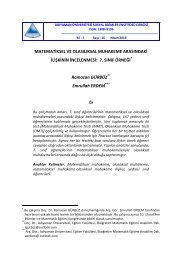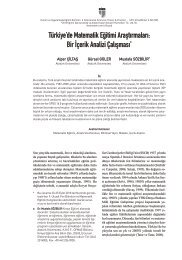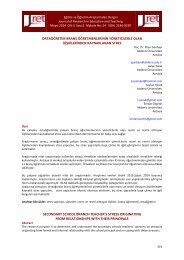1.INTRODUCTIONToday we live in an era in which science and technology constantly advance. Many countrieshave developed educational systems in order not to fall behind these advances. Throughoutthese developments, it has become more and more apparent that for non-English speakingcountries, English serves not only as a foreign language but also as the language of manydisciplines. As Freeman and Long (1991:1) state, English- a second language for most of thepeople of the world- has increasingly become the international language for business andcommerce, science and technology and international relations and diplomacy. Accordingly, ineducational settings, particularly in colleges and universities, English has no longer beenregarded simply as a tool of communication; and its importance is highly respected.Hutchinson and Waters (1987:7) summarize this striking shift claiming "Whereas English hadpreviously decided its own destiny, it now became subject to the wishes, needs and demandsof people other than language teachers."1.1.Problem of the studyA great number of universities in Turkey realizing the fact that the importance of English inall aspects of life is increasing day by day have started to provide a one-year voluntary orcompulsory English preparatory class for their students. However, in order for a languageprogram to succeed, there are various vital components to be considered; and it is a given thatone of these components is evaluation. According to Finney (2002), evaluation must beincluded in all phases of curriculum planning (needs analysis, goals and objectives, languagetesting, materials development, language teaching) and implementation. Firstly, this isbecause evaluation makes it possible to see whether the goals of the curriculum have been metor not. Another thing that makes evaluation necessary is that it provides an opportunity toanalyze the effectiveness of the program itself. For an evaluation study that is carried out forthe former purpose, an assessment of the participants within the program seems necessary. Ifthe purpose for evaluation is to examine the effectiveness, on the other hand, then it is likelyto focus on the teachers, the methodology, the materials and so on (Finney, 2002).1.2. Purpose of the StudyThere have been many studies carried out on language program evaluation in the preparatoryschools in Turkey. However, despite its seven years of demanding service, only a limitednumber of studies on curriculum evaluation have been carried out at Gazi UniversityPreparatory School. In this context, this study aims to provide an evaluation of the currentlanguage program in order to determine the strengths and weaknesses of it and enhance thequality of provided education at the preparatory school. With this purpose in mind, the studyattempts to answer three questions, the first of which relates to the language needs offreshman students studying at partly English-medium departments, another of which relates tothe fitness of purpose of the preparatory program; and last of which relates to the perceptionsof the students on the preparatory program.2. LITERATURE REVIEWIt is obvious that curriculum development and syllabus design are the keystones in anylanguage teaching program and are of great importance in ELT. Brown (1995:19) emphasizesthe significance of curriculum development suggesting "Like any other educationalexperiences, the quality of language teaching depends upon the use of curriculumdevelopment process". Similarly, syllabus design is highly appreciated since it is regarded asa key factor for successful classroom instruction. 8
In the literature on language teaching, the terms curriculum and syllabus are occasionallydefined differently, and sometimes used interchangeably. However, what is common inalmost all distinctions made is that syllabus is subordinated to curriculum, which means asingle curriculum might be the starting point of various syllabi. Correspondingly, whilefollowing the steps of syllabus design, it is necessary to relate it to the wider field ofcurriculum development. In other words, it is possible to regard syllabus design as part ofcourse design, which in turn, forms a part of the curriculum as a whole.2.1. Developing, Evaluating and Renewing the CurriculumSeveral approaches to curriculum development have been reported in the literature in the fieldof ELT. One of the most important statements on the nature and process of curriculumdevelopment ; however, was made by Brown (1995). Emphasizing the need for the continuityof the process and the integrity of all the elements, Brown (1995) puts forward six stageswithin the curriculum development process: Needs analysis, goals and objectives, languagetesting, materials development, language teaching and program evaluation.Richards (2001:1), in a broader manner, suggests that language curriculum developmentdeals with the following questions:1.What procedures can be used to determine the content of a language program?2.What are learners’ needs?3.How can learners’ needs be determined?4.What contextual factors need to be considered in planning a language program?5.What is the nature of aims and objectives in teaching and how can these be developed?6.What factors are involved in planning the syllabus and the units of organization in acourse?7.How can good teaching be provided in a program?8.What issues are involved in selecting, adapting, and designing instructional materials?9.How can one measure the effectiveness of a language program?According to Howard (2007), on the other hand, at the university level, where there are majorfields of study that encompass a collection of courses, there is also the opportunity to design acoherent curriculum which needed not be sequential in the traditional sense. In this context, itmight be problem-based or issues-based, with students making ever-deepening inquiries intocentral concepts and principles. Since in such a curriculum development process, the policywould be open to any modifications; it could be evaluated and renewed when necessary.2.2. Language Curriculum Evaluation ProcedureCurriculum is basically concerned with the process of planning, implementation andevaluation of a language program. In this process, however, it is important that all elements beintegrated so that decisions made at one level are not in conflict with those at another (Nunan,1988:4). Such an emphasis on an ‘integrated approach’ (Thomas, 2005) has led to a more 9
- Page 1 and 2: ISSN: 2146-7676UFUK ÜNİVERSİTES
- Page 3 and 4: UFUK ÜNİVERSİTESİSOSYAL BİLİM
- Page 5 and 6: SUNUŞDergimizin 2014 yılı ilk sa
- Page 7: A NEED-BASED EVALUATIONOF A PREPARA
- Page 11 and 12: focus teaching on this. Accordingly
- Page 13: International Relations) were 20 (7
- Page 16 and 17: questionnaire in their English-medi
- Page 18 and 19: REFERENCESAlagözlü, N. K. (1984).
- Page 20 and 21: APPENDIX A1 STUDENT QUESTIONNAIRE
- Page 23 and 24: 24. Converting short notes into
- Page 27 and 28: The Role Of Gender On University St
- Page 29 and 30: (Johnson 2001; Türküm, 2005). Joh
- Page 31 and 32: Table 1 : Means and Standard Deviat
- Page 33 and 34: 2.3 ProcedureEthical permission to
- Page 35 and 36: age and attitude toward help seekin
- Page 37 and 38: Economics and Administrative Scienc
- Page 39 and 40: REFERENCESAddis, M. E., & Mahalik,
- Page 41 and 42: Koydemir-Özden, S. (2010). Self-as
- Page 43 and 44: LİSE ÖĞRENCİLERİNİN MESLEKİ
- Page 45 and 46: göre mesleki bakımdan daha önce
- Page 47 and 48: Araştırmanın amacıMesleki olgun
- Page 49 and 50: Tablo 1: Lise Öğrencilerinin Mesl
- Page 51 and 52: Lise öğrencilerinin karar verme s
- Page 53 and 54: KAYNAKÇA Acıbozlar, Ö. (2006). Y
- Page 55: Oğuz, Ö. (2008). Lise öğrencile
- Page 58 and 59:
1. IntroductionDifferent from the p
- Page 60 and 61:
noteworthy to mention that multilin
- Page 62 and 63:
The findings indicate that multilin
- Page 64 and 65:
Table 1. Descriptives statistics fo
- Page 66 and 67:
overall six factor structure which
- Page 68 and 69:
wider variety of strategies with a
- Page 70 and 71:
inclusion of instructors who are no
- Page 72 and 73:
Gardner, R. C., & MacIntyre, P. D.
- Page 74 and 75:
AppendicesAppendix A- English Profi
- Page 77 and 78:
ELT Student Teachers’ Evaluations
- Page 79 and 80:
Reflective Teaching in TurkeyIn Tur
- Page 81 and 82:
Table 1: Reliability Analysis o
- Page 83 and 84:
Table 4: Mean and standard dev
- Page 85 and 86:
Table 9: Mean and standard dev
- Page 87 and 88:
ReferencesAkbari, R. (2007). Reflec
- Page 89:
Pollard, A. & Triggs, P. (1997) Ref
- Page 92 and 93:
1. GİRİŞEğitim ve program geli
- Page 94 and 95:
Genelgeçer tek bir bilimsel sürec
- Page 96 and 97:
Program geliştirmedeki yenilikleri
- Page 98 and 99:
-Elde ettiği sonuçlardan hareket
- Page 100 and 101:
“İnternet Üzerinden Öğrenme
- Page 102 and 103:
de sınıf içi dersler de öğrenm
- Page 104 and 105:
teknik ve pedagojik uzmanlar gerekt
- Page 106 and 107:
3. Proje ekibinin kurulması4. Plan
- Page 108 and 109:
KAYNAKÇABigdoli, H. (2004). The In
- Page 110 and 111:
110
- Page 112 and 113:
Hiçbir öğrenci bir diğeriyle ay
- Page 114 and 115:
İçerik sınıfta nelerin öğreti
- Page 116 and 117:
(MEB, 2006; Tomlinson, 2005). Ek ol
- Page 118 and 119:
- Öğrencilerden gereksinim duyduk
- Page 120 and 121:
desteklerine gereksinim duydukları
- Page 122 and 123:
KAYNAKÇAAlberto P. A, ve Troutman
- Page 124 and 125:
124
- Page 126 and 127:
1.GİRİŞBuradaki araştırma OECD
- Page 128 and 129:
öğretilenleri almışlar mı diye
- Page 130 and 131:
edileceğini araştırmaz, ancak bu
- Page 132 and 133:
yaşarlar: Çok fazla sayıda koşu
- Page 134 and 135:
• Birincil Stratejiler ve Destek
- Page 136 and 137:
ir dönemdir. Özellikle artan yaş
- Page 138 and 139:
2. Hipotez: Öğretmenlerin coğraf
- Page 140 and 141:
Tablo 7 Öğretmenlerin Coğrafi
- Page 142 and 143:
stratejileri”ne yönelik bilişse
- Page 144 and 145:
sonuçları χ 2 (12, N =407) = 13,
- Page 146 and 147:
sebebiyet verir. Bunun önemli bir
- Page 148 and 149:
KAYNAKÇAArtelt, C., Stanat, P., Sc
- Page 150 and 151:
Lieteratur. 10. Sonderheft: Lesesoz
- Page 152 and 153:
YAYIM ALANI, YAZIM KURALLARI ve YAZ
- Page 154:
• Birebir alımlar “…” İş




